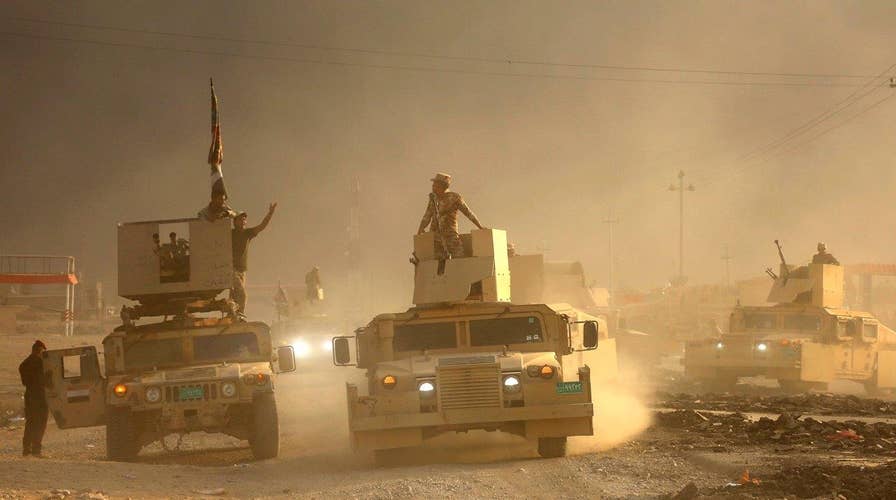The secretive leader of the Islamic State, Abu Bakr al-Baghdadi, is believed to be holed up in the terror group's hub of Mosul, as Iraqi and U.S. forces close in this week ahead of what could be a climactic fight.
Senior Kurdish official Hoshiyar Zebari said his forces had "solid" intelligence al-Baghdadi was somewhere in the Iraqi city of more than a million people and up to 6,000 ISIS fighters. The ISIS leader is likely with the group's bomb maker Fawzi Ali Nouimeh, Kurdish officials told Reuters.
Mosul, Iraq's second-largest city, fell to ISIS in the summer of 2014 as the militants swept over much of the country's north and central areas. Weeks later, al-Baghdadi announced the formation of a self-styled caliphate in Iraq and Syria from the pulpit of a Mosul mosque.
Zebari said ISIS was "disoriented, they don’t know whether to expect attacks from the east or west or north."
If successful, the liberation of Mosul would represent the biggest blow yet to ISIS. After a string of victories by Iraqi ground forces over the past year, the terror group now controls less than half the territory it once held, and Iraqi Prime Minister Haider Al-Abadi has pledged the fight for Mosul will lead to the liberation of all Iraqi territory from the militants this year.
Iraqi Lt. Gen. Talib Shaghati on Wednesday called on Iraqis fighting for ISIS in Mosul to surrender as a wide-scale operation to retake the militant-held city entered its third day.
So far, the militants have put up fierce resistance in villages surrounding the city, where most of the fighting has been concentrated. ISIS has sent trucks loaded with explosives careening toward the front lines and fired mortars to slow the Iraqi forces' advance.
An Iraqi officer from the 9th Division told The Associated Press that his troops were now around 1 half mile away from Hamdaniyah, a historically Christian town also known as Bakhdida, to the east of Mosul.
Over the past day, ISIS sent 12 car bombs, all of which were blown up before reaching their targets, he said, adding that Iraqi troops suffered a small number of casualties from the mortar rounds. The officer, who spoke on condition of anonymity because he was not authorized to talk to reporters, did not provide specific figures.
The operation to retake Mosul is the largest launched by the Iraqi army since the 2003 U.S.-led invasion. Some 25,000 troops, including Sunni tribal fighters, Kurdish forces known as the peshmerga and state-sanctioned Shiite militias known as the Popular Mobilization Units are approaching the city from different directions.
The participation of the Shiite militias in the operation to retake the mainly Sunni Mosul has raised concerns that the campaign could inflame sectarian tensions. Rights groups have accused the Shiite militias of abuses in past campaigns against ISIS-held areas.
In a bid to alleviate those concerns, Shiite militia leaders on Tuesday announced that they will only focus on capturing the mostly Shiite town of Tal Afar to the west of Mosul, and not enter the city itself.
"The only troops who will enter Mosul are the army and police, not the Popular Mobilization Units or the peshmerga," said Hadi al-Amiri, the leader of the Badr Brigade, one of the largest Shiite militias.
"This has been agreed upon," he said at a press conference in the Shiite holy city of Najaf.
Amnesty International said in a report released Tuesday that Iraqi government and paramilitary forces detained, tortured or killed hundreds of Sunni Arab civilians fleeing ISIS-held areas during the operation to retake the Sunni city of Fallujah, west of Baghdad, earlier this year.
The Iraqi government has denied any systematic violations by security forces or the militias, and says individuals have been held accountable for occasional abuses.
The Associated Press contributed to this report.

